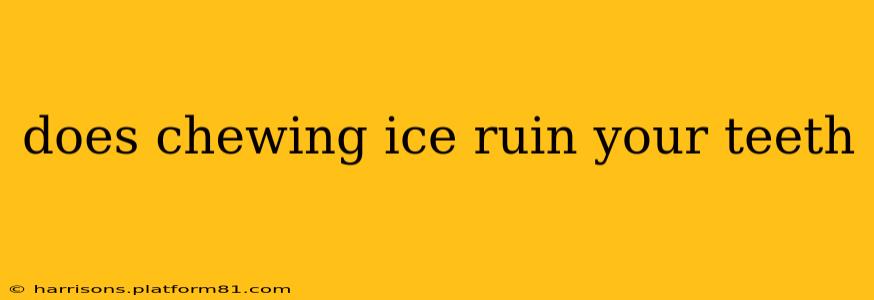Does Chewing Ice Ruin Your Teeth? A Deep Dive into the Risks and Rewards
Many of us have been there: a frosty beverage arrives, and before you know it, you're crunching on the ice cubes. But is this harmless habit actually damaging your teeth? The short answer is: yes, chewing ice can definitely ruin your teeth, but the extent of the damage depends on several factors. Let's explore the potential consequences and answer some frequently asked questions.
What Happens When You Chew Ice?
Ice is incredibly hard. When you bite down on an ice cube, the force applied to your teeth can cause a variety of problems, including:
- Cracked Teeth: The force of chewing ice can create tiny cracks or fractures in your tooth enamel, often invisible to the naked eye. These cracks can weaken your teeth, making them more susceptible to decay, further fracturing, or even breakage.
- Chipped Teeth: More severe impacts can lead to noticeable chips or breaks in your teeth, requiring costly dental repairs.
- Enamel Erosion: While less immediate than chipping or cracking, the constant abrasion from chewing ice gradually wears away your tooth enamel. Enamel is the protective outer layer of your teeth, and its loss leaves your teeth more vulnerable to cavities and sensitivity.
- Increased Tooth Sensitivity: As enamel erodes, the underlying dentin (a softer layer) becomes exposed, leading to increased sensitivity to hot, cold, sweet, or acidic foods and drinks.
How Much Ice Chewing is Too Much?
There's no magic number of ice cubes that determine the level of damage. The risk is cumulative. Occasional ice chewing is probably not a major concern for most people with healthy teeth. However, habitual ice chewing, especially with large, hard ice cubes, significantly increases the risk of damage.
Can Chewing Ice Cause Cavities?
While ice itself doesn't cause cavities directly, the enamel erosion it causes makes your teeth more susceptible to cavities. Bacteria can more easily penetrate the weakened enamel, leading to decay and the formation of cavities.
Does the Type of Ice Matter?
The hardness of the ice plays a crucial role. Crushed ice is generally less damaging than large, hard cubes. However, even crushed ice can cause wear and tear over time.
What Are the Signs of Ice-Related Tooth Damage?
Early signs of ice-related tooth damage can be subtle, including:
- Increased tooth sensitivity: This is often the first indication of enamel erosion.
- Sharp pain when biting down: This may suggest a crack or fracture.
- Visible chips or cracks in your teeth: These are more obvious signs of damage.
How Can I Protect My Teeth from Ice Chewing?
The best way to protect your teeth is to avoid chewing ice altogether. If you find yourself craving the icy crunch, try these alternatives:
- Chew sugar-free gum: This satisfies the urge to chew without damaging your teeth.
- Enjoy crushed ice instead of cubes: This reduces the force applied to your teeth.
- Drink your beverages slower: This helps you avoid the temptation to chew the ice.
How Can I Repair Ice-Related Tooth Damage?
If you suspect you've damaged your teeth from chewing ice, it's essential to see a dentist immediately. They can assess the extent of the damage and recommend appropriate treatment, which may involve:
- Dental bonding: Repairing small chips or cracks.
- Dental crowns: Protecting severely damaged teeth.
- Root canals: Treating infections caused by deep cracks or fractures.
In conclusion, while the occasional ice cube probably won't cause significant harm, habitually chewing ice puts your teeth at risk of damage. Protecting your smile is worth avoiding this potentially damaging habit. Consult your dentist if you have any concerns about the health of your teeth.
